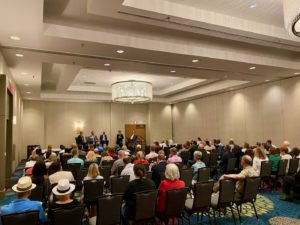Sen. Hawley boycotts Big Tech’s private ‘cocktail party’ in Senate, warns of AI consequences for children
Calling it a “cocktail party” for Big Tech, Missouri Sen. Josh Hawley refused to attend a Senate meeting with the country’s most powerful IT execs Wednesday to discuss the dangers of…

Calling it a “cocktail party” for Big Tech, Missouri Sen. Josh Hawley refused to attend a Senate meeting with the country’s most powerful IT execs Wednesday to discuss the dangers of artificial intelligence.
Hawley’s absence, especially noteworthy due to his leading-edge legislation to curb a largely unchecked AI industry, was a protest for the meeting being closed to the public – despite X CEO Elon Musk noting the meeting “might go down in history as being very important for the future of civilization.”
“I didn’t attend it because I’m not interested in promoting the Big-Tech cocktail party,” Hawley told The Lion in an exclusive interview Thursday. “This was the biggest tech moguls – all the people who censored the Hunter Biden laptop story. All the people who have collaborated with the White House to censor speech, to shut down parents in the state of Missouri who had concerns about the vaccine, who had concerns about mask mandates, concerns about CRT. These are the people who did all that stuff.
“And now we’re supposed to take direction from them about how to regulate AI? No, thanks. I don’t think so. And we’re supposed to do it behind closed doors, by the way, where you can’t ask any questions in public and they’re not accountable?
“These people need to be held accountable, not given the red-carpet treatment and their feet kissed.”
As the Associated Press reports, one outside observer, Sarah Myers West – managing director of the nonprofit AI Now Institute – “estimated that the combined net worth of the room Wednesday was $550 billion and it was ‘hard to envision a room like that in any way meaningfully representing the interests of the broader public.’”
As Hawley noted to reporters, “I don’t know why we would invite all the biggest monopolists in the world to come and give Congress tips on how to help them make more money and then close it to the public.”
Instead, Hawley took the opportunity of a Tuesday hearing before the Senate Judiciary Committee to grill Microsoft President Brad Smith on AI’s potential impact on teens and children.
The minimum age for the company’s AI program Bing Chat is just 13.
Such programs, including ChatGPT, “can compose human-like passages of text, program computer code and create novel images, audio and video,” reports the Associated Press.
Hawley warns the programs also “can be incredibly manipulative. We’ve seen instances where chatbots have tried to break up people’s marriage. Chatbots have given instructions on how to commit suicide. We shouldn’t have our kids subjected to that.
“So 13, I think, is way too young. We need to help parents here. Give them an age limit; 16 at least. Make it verifiable, where it’s on the company to verify the kid’s age – and don’t let them target our kids.”
Hawley also basted the Microsoft chief over its deep entanglements in China, and whether Americans and American workers will end up benefiting from the company’s AI products.
“I confronted him and I said listen, Microsoft is way too involved with China. They’ve got data centers in China. They’ve helped China with their own AI, China’s AI. They need to get out of China. They need to bring those jobs back to the United States.
“This AI stuff, if it’s going to actually work for Americans, it needs to help create jobs, not destroy jobs. It needs to make America stronger, not China stronger, and needs to protect our kids. And I’m just concerned about what these AI companies are doing.
“I know it’s going to be good for them and their bottom line at the end of the day. I’m not so sure that it’s going to be good for American workers and kids. That’s the challenge.”
Hawley also warned consumers of privacy concerns.
“When you go on with a chatbot, it collects all that information, it stores it. They shouldn’t be doing that with kids, No. 1.”



